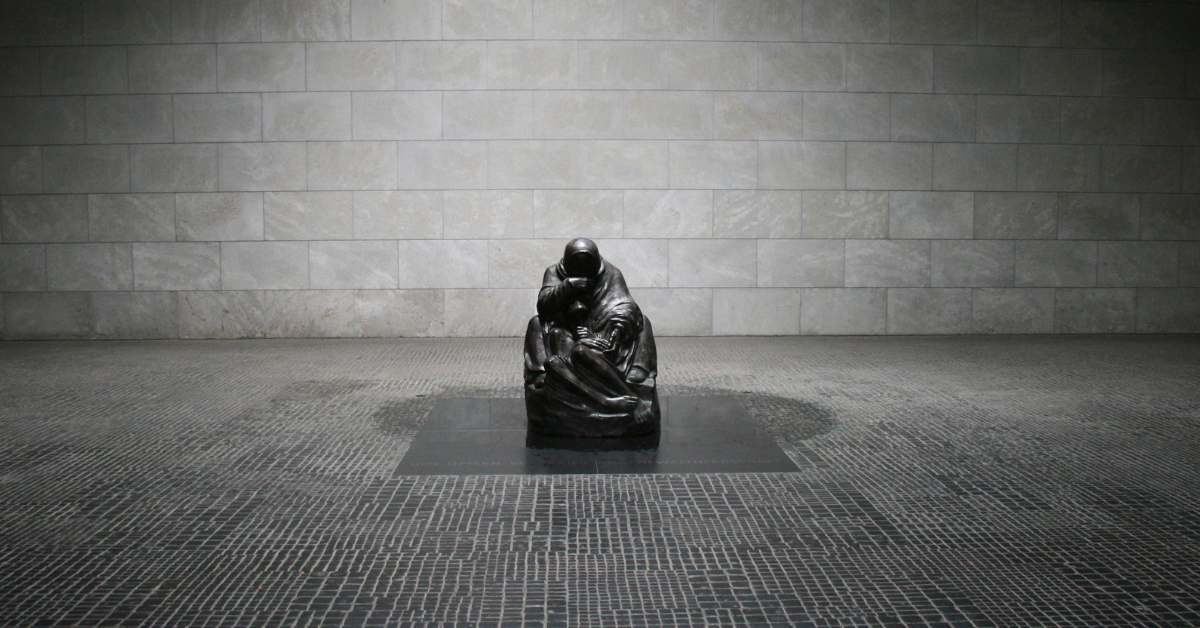
OR, ==> CLICK HERE TO DOWNLOAD THE EPISODE.
Self-Mastery: A 90 Day Spiritual Challenge
At the core of my upcoming book is the principle of freedom for excellence, or “disciplining the desires to make the good, at first accessible, and then effortless.” I am not a moral relatavist, if you couldn’t tell. Some things, I believe, are really good in life, and therefore really good for you. Now, to know what is really good is just to know what you ought to do; there is no separating these concepts.
In short: Things are not good just because you desire them. Rather, some things are really good (in and of themselves), and so those are the things you should desire.
Freedom for excellence means realizing ones higher potential and calling in life, which can only be achieved through daily acts of discipline, restraint, and self-denial. I am not free to express myself on the guitar, unless I have given up all the bad habits that stop me from practicing effectively. Same with fitness, eating, and, as I’m about to argue, our connection with God and the formation of our soul.
Here’s how I explained the concept of freedom for excellent in an email to my subscribers:
The point of this 90 Day challenge is to increase self-mastery and control over the rampant desires and heedless addictions that deform our spirit and suck the life out of our relationships. I asked my subscribers to wish me luck, after letting them know I was doing this, and I got hundreds of emails asking for further details.
I hadn’t planned on sharing details, however, since this challenge is fundamentally a religious discipline and I am not really in the business of teaching that sort of thing, though (oddly enough) the Sunday School segment of my podcast, which focuses on theology and philosophy, has consistently become my most listened to. This tells me that people are looking for more, which is no surprise, because so was I. Saint Augustine explains the condition best, I believe: “Thou hast made us for thyself, O Lord, and our heart is restless until it finds its rest in thee.”
People have also taken guesses at what the challenge is that I’m doing, and while I have borrowed from a number traditions and teachers and programs (particularly in the Catholic tradition, including Conversion, Exodus 90, the Do It Home Retreat, and others), this challenge is really rather of a hodge-podge of stuff I’ve done previously (or read about previously…), and stuff I’ve come up with on my own.
Here are the general details:
- Daily prayer and meditation
- Regular, intense exercise
- Bi-weekly fasts
- Abstention from: Alcohol, sweets, and snacks
- Elimination of non-essential electronic device time (movies, video games, social media, etc)
- Intentional time with others (especially family)
- Hour of study
- Cold showers
- Daily acts of discomfort
- Nightly examinations and gratitude journaling
- All my Catholic stuff (mass, reconciliation, adoration, readings, etc)
Let’s take each of these in turn.
My day begins with meditation and reading and prayer.
The readings are Old Testament ==> New Testament ==> Catholic Catechism, in that order. I think this is a good study approach, or at least it has been my approach. Commit to a few passages or a certain amount of time to each per day, and fairly soon you will have accumulated a good bit of religious enrichment.
Recommendations: If you are new to the Christian/Catholic faith–or simply wondering why it is worth looking into (despite everything you may have heard!)–then I would recommend wholeheartedly the following (B = beginner, I = intermediate, A = advanced): Mere Christianity and Miracles by C.S. Lewis (B), Handbook of Christian Apologetics and Five Proofs for the Existence of God (I), The Blackwell Companion to Natural Theology and The Resurrection of the Son of God (A)
Also, from my own writings/podcast: Why I Became Catholic (In Spite of Hating Religion), How to Think About God: The Argument From Contingency, Exploring the Mind-Body Problem and Why Materialism/Atheism Fails, and The Difference of Jesus and the Difference He Makes. The reason I offer so many recommendations at this point is because the whole of this challenge is really rather pointless if you’re not starting from the Christian (and, arguably, the Catholic) position, so I hope these offer insight to any seeking and/or curious person.
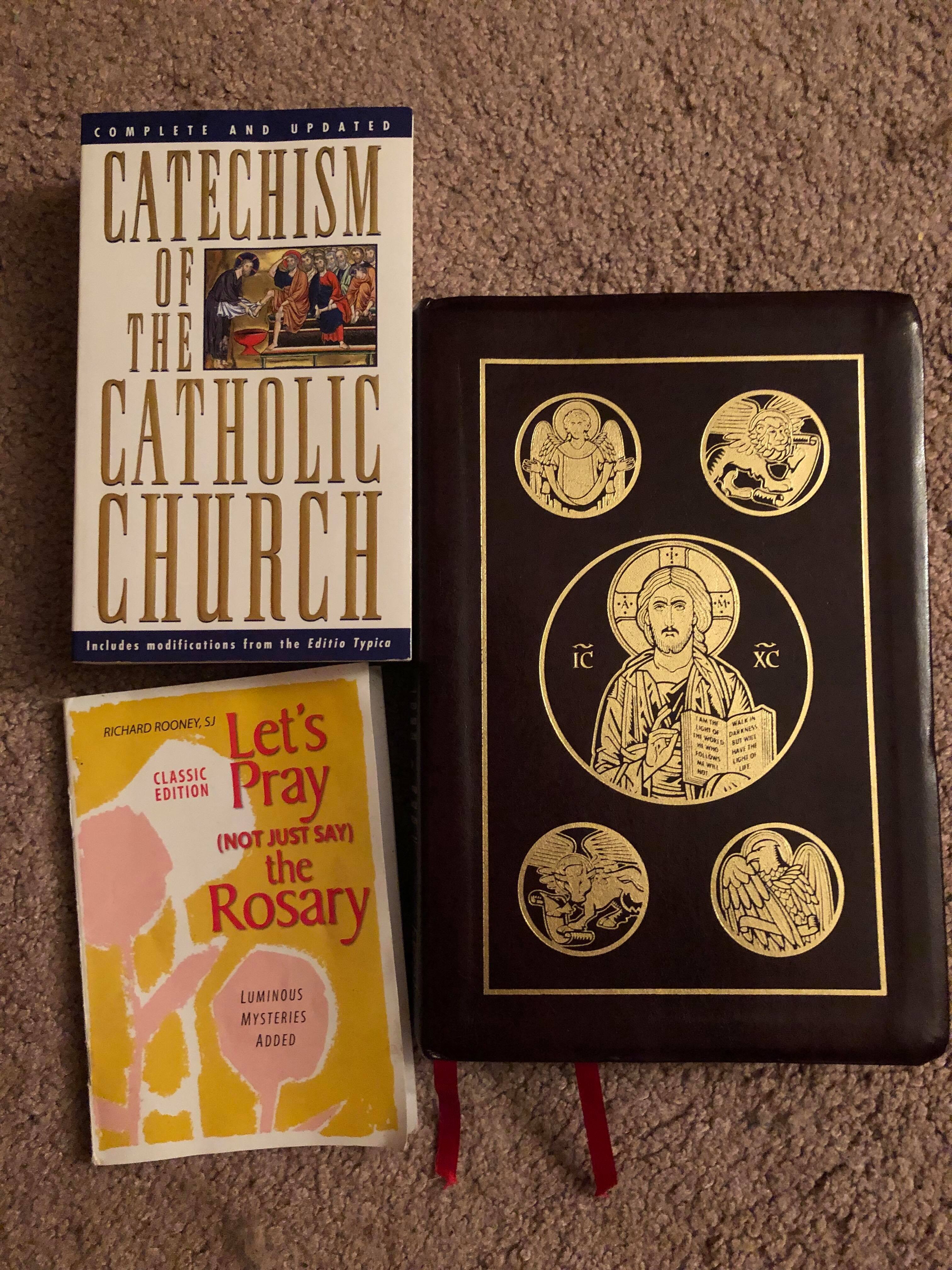
Once the readings are done I pray the Rosary and my Prayer Rope (15 minutes for the Rosary, 5 – 10 minutes for the Jesus Rope), then spend another 10 – 20 minutes in contemplative prayer and silent meditation. The minimum time commitment for this daily spiritual practice is thirty minutes. Better if you can extend this to an hour.
The vocal and repetitive prayers are rhythmic and centering. They focus the mind for deeper meditation and contemplative prayer. For people like me (which is to say, people with a severe case of monkey brain), I find the repetitive (repetitive =/= boring, mind you) nature of the Rosary and prayer rope, and the rhythmical breathing that accompanies it, absolutely soothing and essential.
Meditation and prayer are much like exercise. The more you do them and the longer you do them for, the more you get out of it. Then, also like exercise, on the days you skip out, you feel somehow… off. Nothing feels exactly as it should. But on the days you get it done, your efforts there-forth are multiplied and your focus is (typically) tremendous.
Next is exercise and eating. These are not as tough for me (doesn’t mean they aren’t tough, at all), since I’ve established a fair amount of discipline in both these areas already. For training I am sticking with Strong ON! + some added bodyweight stuff. (3 – 5 intense workouts per week, plus mobility and walking). For eating I’m using a modified version of my 5 Day Kettlebell Fat Furnace (which, ahem, I’m offering free for anyone who pre-oders my upcoming book and submits their receipt here: http://www.howtobebetterbook.com.). This program utilizes a 5/2 fast, where twice per week calories take a nosedive. That means just one full meal at night and (maybe) two smaller meals during the day. Also–and this will be tough for me–no meat on the fasting days.
Other eating guidelines include: No booze, no sweets, and no snacking. Again, not so much an obstacle there, aside from snacking. I’m not a grazer, but I do have an extra protein shake, here or there. So, no more of that, at least for the time being. Either way, this is pretty much how I normally eat, and it’s pretty ideal (I’ve found) for staying lean while still getting strong. [Enter totally non-essential bathroom selfie.]
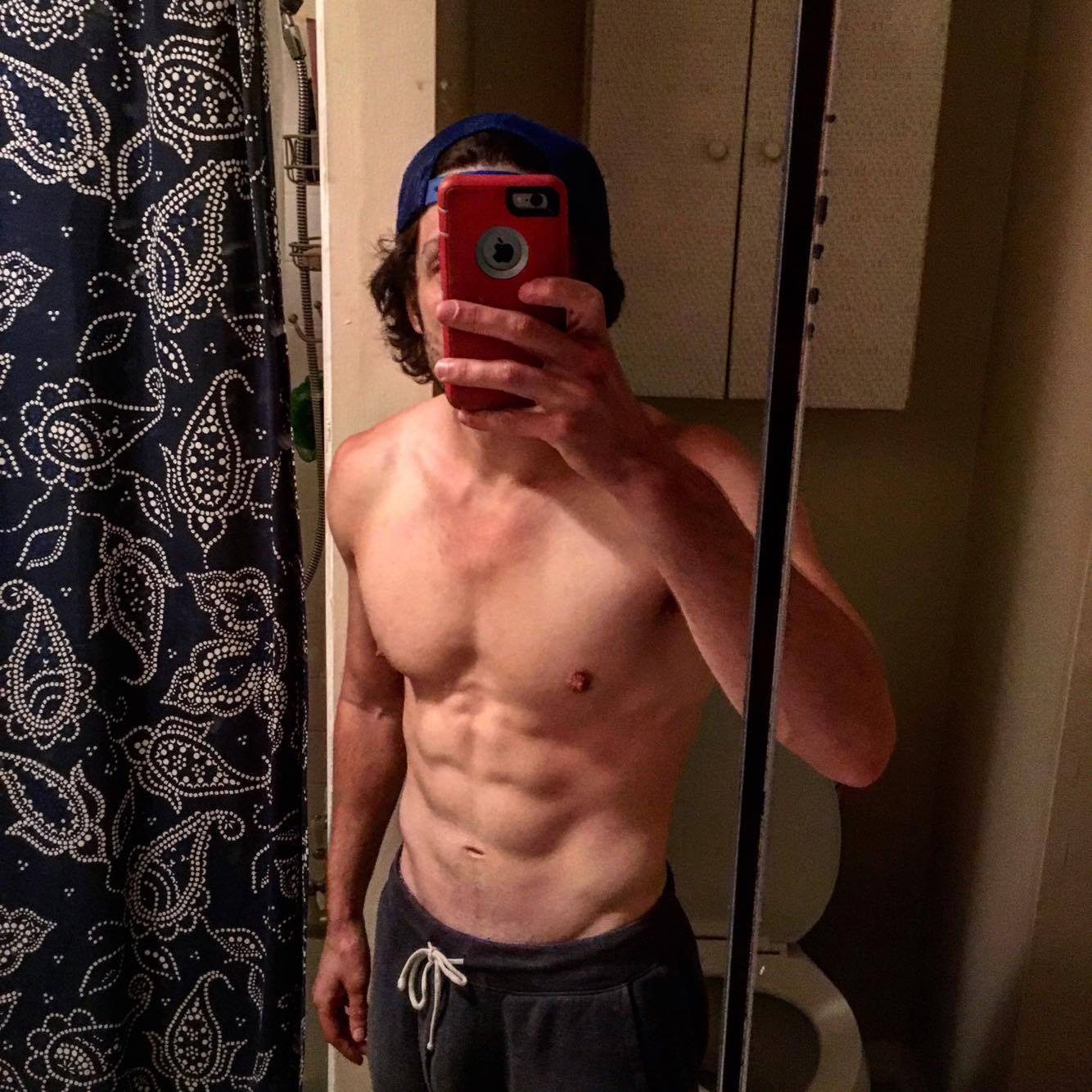
People sometimes choose to omit these disciplines (prayer, meditation, exercise, etc) because of “time constraints”. To that I only have one thing to say: Suck it up, or stop complaining. I’ve got three kids, am writing one book, launching another book, running businesses, coaching and consulting clients, designing programs, playing guitar, and finishing my masters in philosophy. If I can find the time to do this stuff, then, well, I hate to get comparative, but the whole “I don’t have enough time” thing, is the most limpid excuse to ever drag itself out of anyone’s mouth, and the point of this challenge is to expose just how vacuous our “reasons” for exempting ourselves from these disciplines really are. You simply make the time. You wake up early or go to bed later or you stop watching so much T.V. Whatever you have to do.
Speaking of: All non-essential electronic device time is also to be eliminated. This is one of the main reasons I started this challenge in the first place. I saw the report for a few weeks of time spent on my phone and was absolutely appalled by it. Not just on social media, but time wasted playing silly, little video games. Well, all of that is gone, for at least 90 days, and hopefully forever.
People in the Strong ON! group have asked how I’m handling the social media thing, since that is such an essential part of my community. The answer is fairly easy: I am only engaging on social media in places that are essential to my community and business (namely, the Strong ON! group and my social pages), but avoiding any mindless scrolling or engaging in other feeds. Next, I have set aside specific times for when to engage, so that I am not always checking my phone, but have decided ahead of time when I am going to interact. This, as I have already seen, is making my engagements more intentional, meaningful, and helpful. I think it’s a benefit for everybody.
But no scrolling through Twitter, Facebook, or Instagram. if I log in to social media, it is for a specific reason and one which has been decided on ahead of time. I do not believe all of social media is a bad thing. In fact, I believe the community we’ve built as part of Strong ON! is one of the most inspiring and uplifting places to be, especially online. There is no reason to pull away from that, and I know many people find their daily motivation there. This challenge does not force me to separate myself from my online community, but rather allows me to focus more on it by casting away all those other countless, online distractions.
A point I made in an earlier email:
Intentional time with others really means more dedicated time with my family and friends. For me, this means a hard stop on work at least an hour before dinnertime, to play and read with my kids. Dinner is a very special time for my family. We say grace, then go around the table and everybody talks about three things they are thankful for, and one thing they learned that day. After dinner is usually “divide and conquer” on getting the kids to bed, my wife takes Isla, and I handle the older two.
Daily acts of discomfort are–as any of our cognitive scientist friends, will know–a form of exposure therapy. If you are anxious about something, one of the best ways to stop being anxious is to not only meditate/pray, but to engage in that very thing which causes you anxiety, no matter how uncomfortable it makes you. This puts callouses on, so to speak; the more you expose yourself to discomforts or anxiety-laden situations, the easier those situations become. Not because the situations themselves get easier, but because you become stronger. So, I’ve got my list of daily things to do there, most of which are emotional challenges, more than physical. It’s just one per day.
Cold showers are pretty much what you assume. Short, and brisk. I’ve used these intermittently, but this will be the first time where I use them exclusively. So, yay. The point here is pretty much the same as everything else. You learn to get comfortable being uncomfortable, and through imposing restrictions, and engaging in self-denial, you obtain liberation. Also, there may be some hormonal benefits, as well.
My hour of study is essential since I’m still in school, but has always been a part of my life anyway, so I simply decided to make it a formal part of the challenge. That said, I think this would be good for everyone. Because it really rounds off the nature of the challenge, and promotes generalism: Spiritual, emotional, physical, and intellectual growth. Currently, I’m working through our good ol’ friend Plato again (Apology, Crito, Phaedo, and The Republic, specifically).
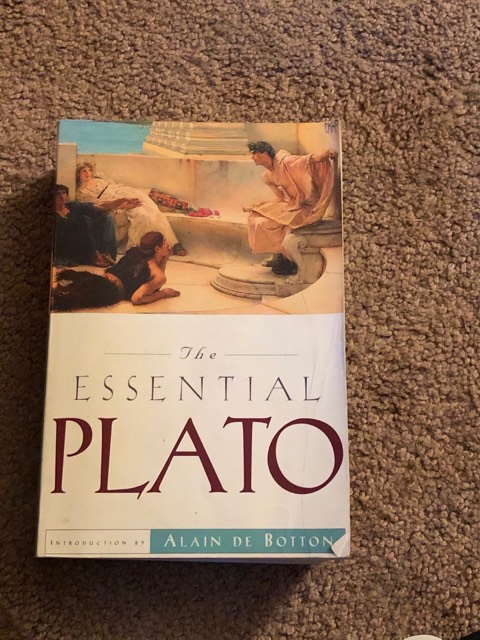
When it comes to studying–really, when it comes to any form of training, at all–you want to be “challenged, but mostly successful.” When practicing the guitar, I typically play things which I can perform well maybe 8 out of every 10 times. If I can perform something well 10/10 times, then I’m not being challenge enough: I need to move on. I need to up the tempo or increase the complexity. Same with weight lifting, and same with the stuff you read. You need to be challenged. You need to miss a few reps here or there, and you need to struggle with understanding, at least occasionally. If not, then you’re just not going to improve; you’re just not going to learn anything, since to from a state of understanding less to understanding more, is not the same as acquiring information. You need to be “reading up”, as it were. (A great book on this is How to Read a Book.)
Nightly examinations and gratitude journaling: This is measuring what matters. You constantly hear me talk about how important logging is. Well, it’s no different here. Each night (and often on this blog) I’ll be recording how my day went, and highlighting what my successes and challenges and failings were. It’s through these acts of self-review that we can systematically improve. Additionally, is focusing on all the good things going on in life, which, to be honest, is quite a lot. Gratitude journaling has always made a major difference in my life and especially my attitude toward others. Just one paragraph of what you’re thankful for at the end of everyday is all you need. More, however, is certainly encouraged.
Finally, is just living the Catholic life, which at this point just is my life. That means daily mass, weekly reconciliation, adoration, etc. Daily mass was a habit I started last year when I first converted to Catholicism. It fundamentally transformed everything about my life, and I’ve stuck to it fairly well. But over the next 90 days I’m committing to more than just “fairly well.” This also gives me community and fraternity, which is essential. Aside from the support of family members, a challenge like this is not something a person can do alone, I don’t think. You need people to not only hold you accountable, but to help you along when the going gets tough. I think I’m a pretty iron-willed person (I certainly wasn’t always that way), but I know I’m going to need plenty of help these next three months. Simply being able to daily connect with people at mass, many of whom are doing something similar, re-energizes my commitment and gives me the foundation I need to make it through. There’s also a once per week men’s group at my parish, which is nice.
I know I just threw a lot at you, but let’s see if we can summarize, and if I can offer some resources and “equipment” so (if you’re as crazy as you look) you can do something similar yourself.
Resources and “Equipment”
On Freedom for Excellence: My upcoming book How to Be Better at (Almost) Everything. This explains why self-improvement is really about obtaining freedom in the way that humans were intended.
For workouts: Strong ON! for the ideal structure and periodization. (Surely you could just use some of my Youtube workouts, as well.)
For eating: My 5 Day KB Fat Furnace (5/2 fast + eating guidelines + strategic meal replacements). Free when pre-ordering my book and submitting the receipt here: http://www.howtobebetterbook.com
For studying: Honestly, any of the books I recommended above, since most are philosophically challenging, and religiously insightful.
My Religious Arsenal: Here’s the Rosary I have (and here’s the booklet if you’re new to this), and here’s the Prayer Rope. I read the Ignatius Bible, Revised Standard Version – Second Catholic Edition (this is the specific one I have, though there are more affordable ones on Amazon. I figured if I was going to splurge on anything…). And here’s the Catholic Catechism.
Acts of Daily Discomfort: This is really an individual thing. Think about what makes you nervous. Public speaking maybe? Sharing your progress in the Strong ON! group? Whatever that something is, commit to performing one act in that direction per day.
Cold Showers: Usually only 3 – 5 minutes. Be sure to get the cold water on your head and the back of your next.
Community: While this isn’t an official Strong ON! challenge, you can certainly take advantage of the Strong ON! community if you plan on doing this or something similar. (We just ask you keep the workout discussions focused on Strong ON!, and not some other program). But I would highly recommend getting some local support as well. That’s where your local church–you know, the one you’ve never stepped into, or haven’t stepped into for 15 years, if you’re anything like I was–may be of enormous and surprising help.
Intentional Quality Time with Others: Make dinner with loved ones a high priority, and do your best to stop any work-related or non-essential activity at least 30-60 minutes beforehand. Try to get out with friends and/or loved ones for some intentional, bonding activity (that isn’t related to eating or alcohol!) at least once per week, as well. Maybe this is the gym, or maybe this is something church related. For me, it’s both.
Logging and Gratitude Journaling: I just use my blog and a legal pad for this. Some people like a fancier something to write on. Whatever you pick, just be sure you’re consistent with it.
…
OK, well, that’s all I can think of for now, but I’ll update this as more comes to mind. You probably have some questions, however. If so, the comments are open.
Strong ON!
– Pat
…
How to Be Better at (Almost) Everything Pre-Order Extravaganza!
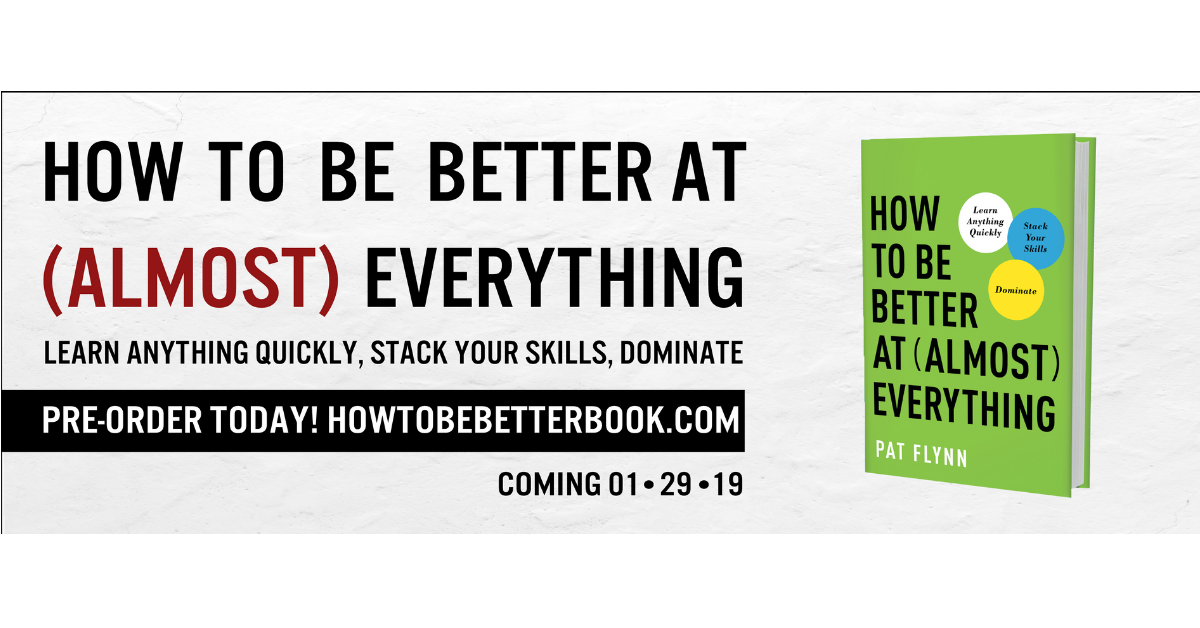
Real Quick: For a short time only, we’re giving away a TON of really cool fitness programs, nutrition plans, and more, to anyone who pre-orders a copy (or 3!) of Pat’s upcoming book How to Be Better at (Almost) Everything.
This is a limited time offer, so be sure to take advantage of this while it lasts by clicking the link below!
==> http://www.howtobebetterbook.com
…
The Pat Flynn Show
If you enjoyed this episode, it would mean the world to me if you could subscribe to, and leave a review for, The Pat Flynn show on iTunes HERE or Stitcher HERE.
Reading your reviews and hearing your feedback is what keeps me fired up to make The Pat Flynn Show happen. Thank you!
This 90-day challenge sounds, well, challenging. At the same time, it sounds like a great way to overhaul yourself and get back on track (perhaps for the first time ever in your life). You are so right about people using the “I don’t have enough time” excuse, Pat. It’s lame and people either make time for what’s important or they waste time playing video games, watching cat videos, etc. Time management is key to a disciplined life.
This is a wonderful program Pat and I’m happy to say I couldn’t agree with you more about your point, ““The point of a challenge like this is not to say ‘no’ to everything, but to say ‘yes’ to so much more.” It reminds me of when I was in Reformers Unanimous (an addictions ministry) and I learned that God isn’t telling us not to do things as much as to avoid the things that make us get into trouble, hurt ourselves, etc., thus opening our lives up to so much goodness. When it comes to prayer and Scripture, I pray every morning and read the Bible before I start my day. Not only is it a good way to begin the day, but it’s a way to make sure I do it every day. I read one psalm, a proverb (based on the day so today I read Proverbs 24), and a chapter from the New Testament. I find this is an excellent way to draw closer to God and to meditate on His Word by taking my time rather than getting into a marathon mode of reading Scripture. As for social media, studies have shown it is unhealthy, particularly when you spend considerable time on it. If nothing else, it is a waste of time and I know very few people who say they have too much time on their hands. Pat, I have to be honest and say I’m not sure about the cold shower thing. I had to deal with cold showers when I was in prison and I vowed to avoid them at all costs. It is a good way of toughing up, but this is going to be tough. Nonetheless, an excellent plan. Naturally, I won’t be doing the Rosary or a prayer rope, but I admire the discipline and desire to draw closer to God.
When it comes to logging and journaling, I like to use a fancy book. It makes me feel what I’m writing is more important and I can usually pick up a fancy-looking journal at the dollar store. One important thing though is neither a fancy journal or notebook won’t do you any good if you don’t write consistently.
Sorry Pat but you know I usually end up finding something else to comment on. First, the idea of dedicated time with friends and family is great. We need it in today’s world where the family is at risk and at the risk of sounding self-aggrandizing, we need to be there for them and shine God’s light. As for writing our journal I wanted to share this. I am a writing major and one of my professors told me that writing with a pen (or pencil—or crayon if you’re so inclined) does something positive for the brain that using a computer doesn’t. So definitely use a journal and write it down holographically!
I agree with that completely. I still write more often on my computer (or worse, my phone) than I should, but I’m glad for all the years I spent writing by hand. That really did a lot for me.
Well Pat, interesting challenge you’ve took on! I truly believe on the idea of being intentional, it makes you feel that you indeed are living and making the best out of your life because you are genuinely living the moment. Stripping away the non-essentials would definitely be a challenge but of the people I know you would be one who would be able to do it. Interestingly, I think there’s an app for this already a while back, but the latest software of Android integrates a way where it helps you not use your phone as much. It makes you set how much screen time you want per day or per app and then it literally makes your screen go black when you used up all the time, giving you the option to extend 15 minutes and etc. I’ve found that useful when limiting my own usage regarding my phone.
Also, thank you for sharing good references Pat, especially when you’ve segregated them as Beginner, Intermediate and Advanced. I remember when I first asked you about good books to read with own personal journey in learning more about Christ. As always, more power and I admire you and the work you do! Thank you for helping me learn more and more about life.
I love everything about this. I can’t wait to get started myself. Thank you for the inspiration.
Good luck!